Physiotherapy

About physiotherapy
Physiotherapy is a subdivision of medicine that focuses on assessing, recovering, improving and promoting human health, movement and physical capabilities in both healthy subjects as well as those who are suffering from an illness or injury. Depending on the illness, injury and the client, the main tools of a physiotherapist are:
- physiotherapeutic assessment of the client,
- client consultation and education,
- manual therapy (including massage),
- therapeutic exercises,
- therapeutic modalities (i.e. ultrasound, laser therapy, shockwave therapy, etc).
The main outcomes of physiotherapy are an improvement of the client’s quality of life and his/her physical and functional capabilities. A physiotherapist can help you with various health-related issues, including but not limited to:
- musculo-skeletal disorders (i.e. muscle or joint pain, injuries, postural disorders);
- neurologic disorders (i.e. rehabilitation after a stroke, peripheral nerve injury or disorder);
- various internal diseases (i.e. cardiovascular diseases, respiratory diseases, rheumatoid arthritis, gout, etc);
- recovery from trauma or surgery/preparing for surgery .
Structure of the physiotherapy process
The physiotherapy process at Gymnasium Physiotherapy generally consists of the following stages:
- Collecting the medical history of the client: collecting all the relevant data regarding the client’s medical history, signs and symptoms, results of tests and any diagnostic imaging carried out previously as well as documenting all the previous methods of treatment and procedures performed. In addition to that, an important part of this stage is collecting info regarding the client’s past and current movement habits, level of activity and general pace of life.
- Physiotherapeutic assessment of the client and identifying the root cause(s) and etiology: assessing the client’s posture, basic movement patterns, proprioceptive and physical capabilities (i.e. joint range of motion, strength and endurance, muscle elasticity and tone, etc). Case-specifially, additional tests may be required. For example in the case of an acute injury specific clinical tests must be carried out. In the case of neurologic disorders, specific signs and test must be performed and assessed.
- Explaining the root cause(s) and etiology of the problem at hand and educating the client regarding his/her problem: explaining the findings of the physiotherapeutic assessment to the client. I consider this to be one of the most important aspects of the physiotherapy process, since I firmly believe that a thorough understanding of the problem, it’s etiology and the adaptations and mechanisms required for treating the problem lays the foundation necessary for a successful recovery.
- Setting goals and formulating a therapy plan in co-operation with the client: setting clear, realistic and motivating goals and forming a therapy plan to help reach these goals. The therapy plan formed in co-operation with the patient takes into account all the specifics of the client’s lifestyle and pace of life.
- Therapeutic exercise, manual therapy, therapeutic modalities: performing the procedures necessary to help the client with his/her health-related issue. Since different illnesses, injuries and syndromes need to be treated differently, each and every therapy process is individualised and structured to meet the exact needs, requirements and restrictions of the client. The most common physiotherapy methods are therapeutic exercise combined with educating the client regarding the basic movement patterns (various balance, strength, endurance, co-ordination, stretching and relaxation exercises, etc), manual therapy and various therapeutic modalities (i.e. ultrasound therapy, shockwave therapy, low-level laser therapy, etc).
Are you unsure about whether physiotherapy is the best way to help resolve your health-related issue?
Contact us and we will help clarify whether physiotherapy is the best solution for your problem.

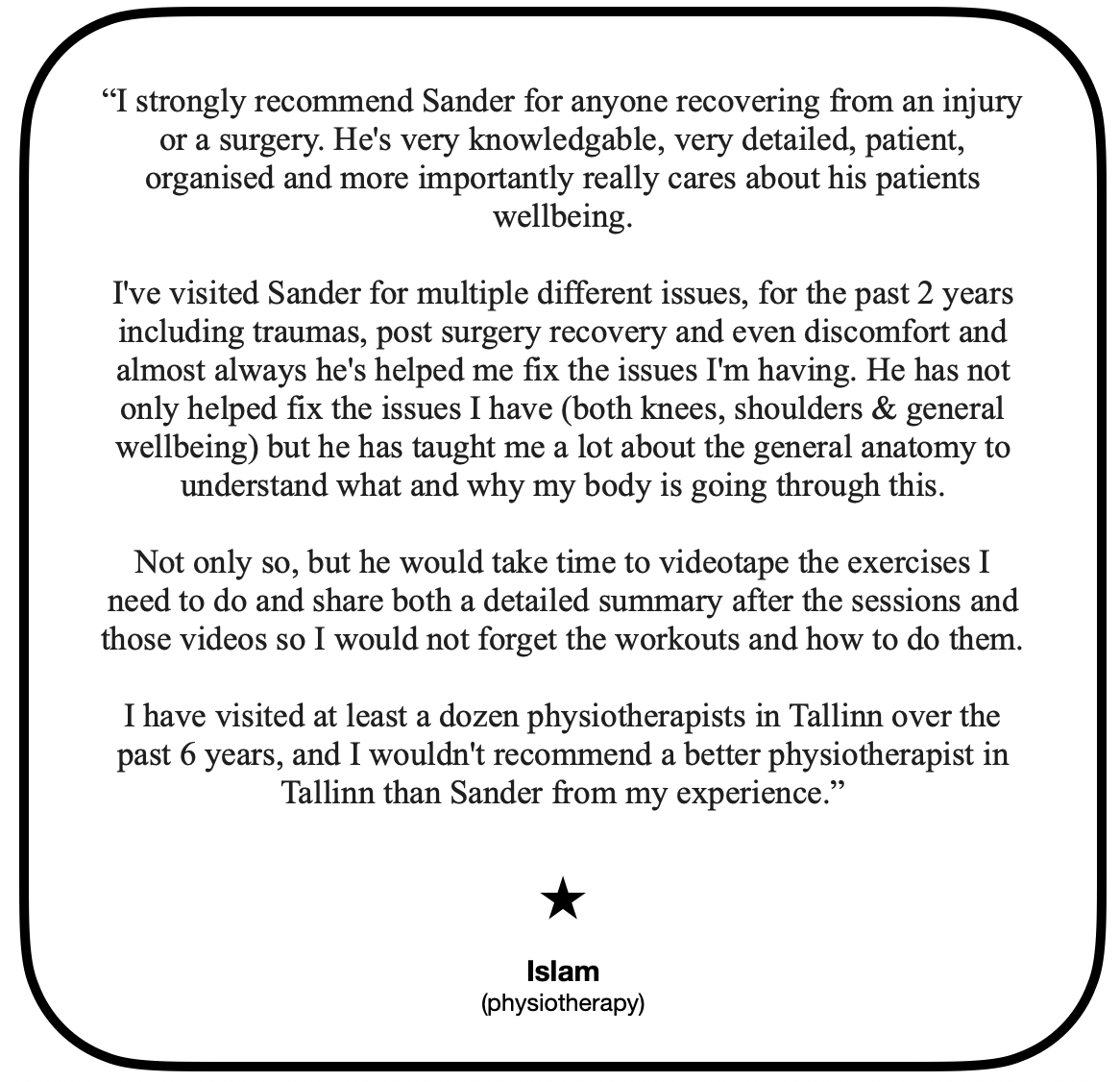
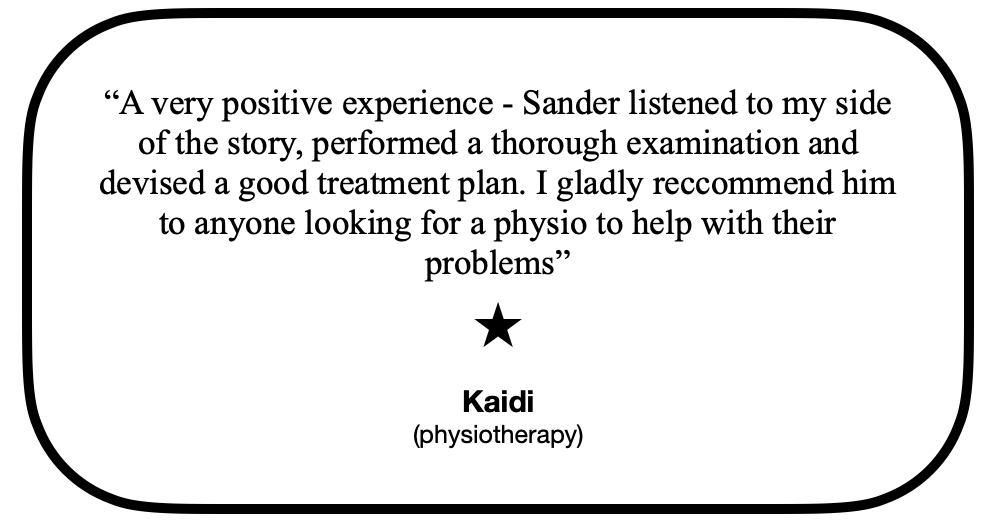
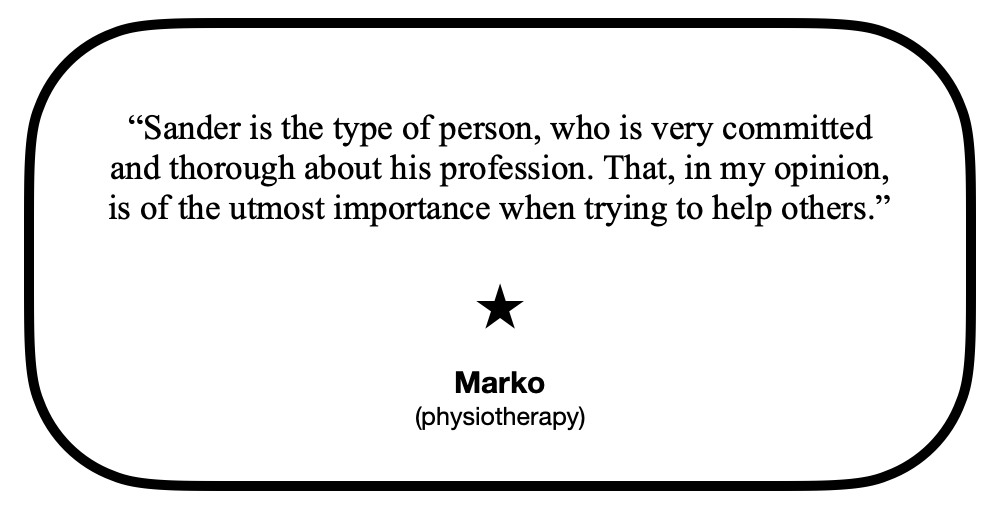

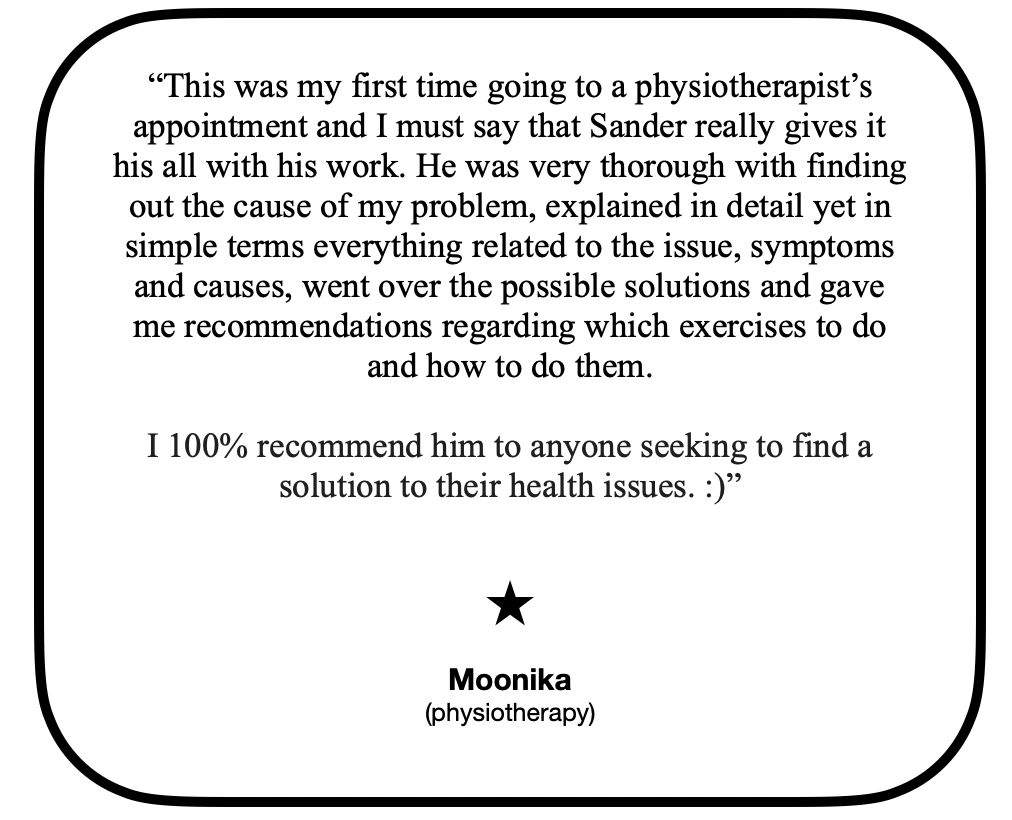

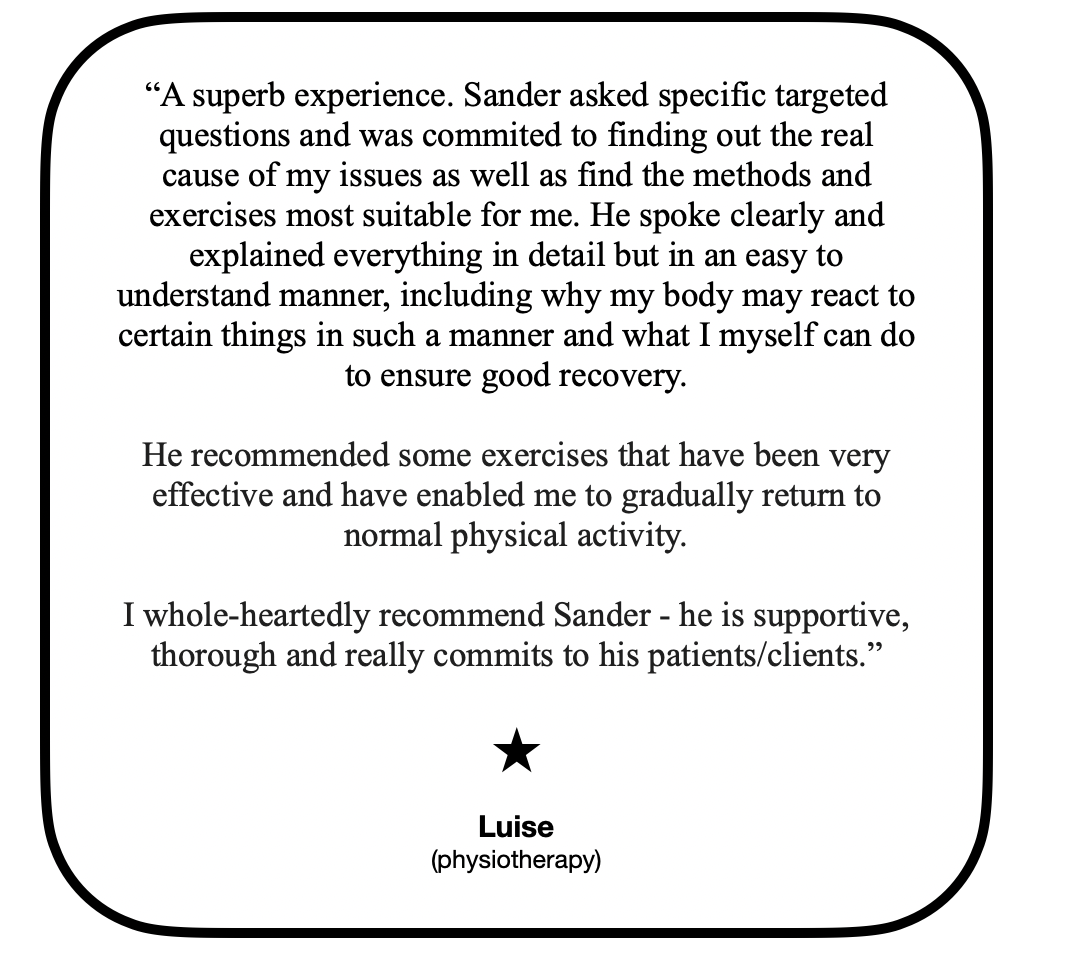
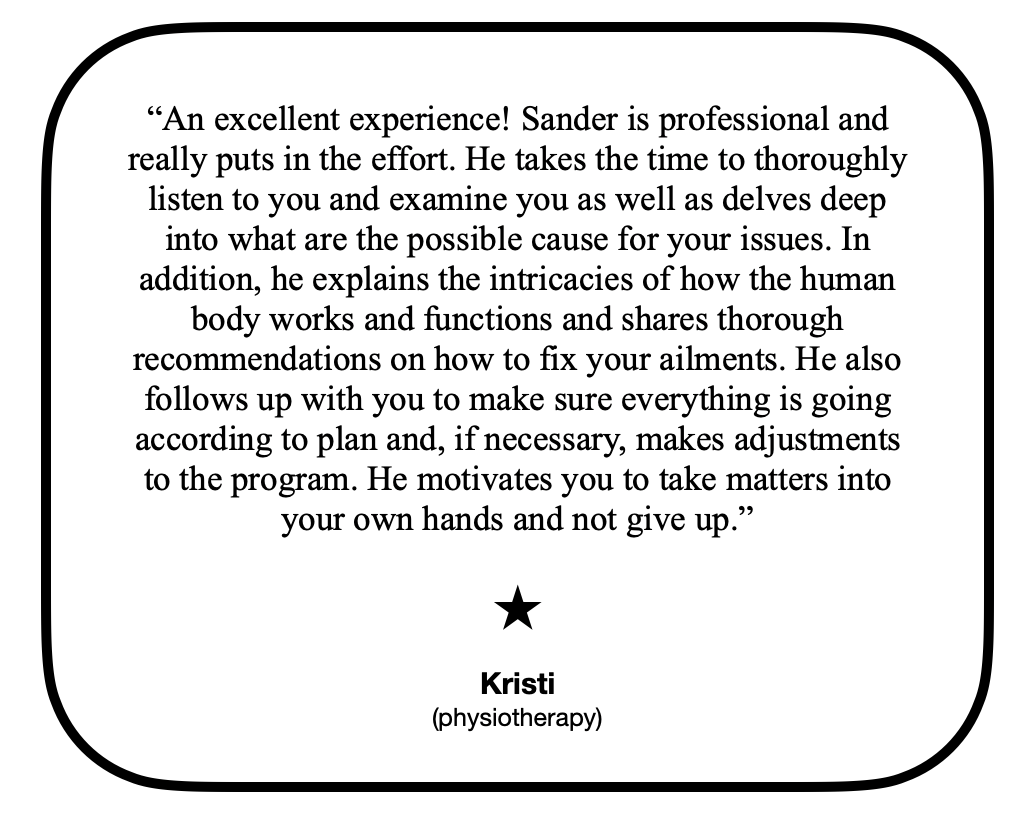
Frequently asked questions
As soon as a problem arises. If you have a health-related issue, that you think might be alleviated with the help of a physiotherapist, then we recommend visiting one at your earliest convenience. The reason for this is, that most health-related problems do not resolve spontaneously and tend to progress over time. A professional physiotherapist can help you provide a solution and alleviate or in some cases even prevent further problems.
The number of visits necessary to solve a client’s problem depends greatly on the severity of the health-related issue at hand as well as the amount of possible comorbidities. In the case of less severe issues and issues affecting only one organ system or area may only need one visit, whereas more severe and complex cases may need two, three or four sessions to provide a long-lasting solution. Most cases, however, require two or three sessions. Sometimes, it is also wise to assess progress after a few weeks or months, depending on the problem.
A short review of the common problems a physiotherapist can help resolve is provided in the first part of this page, in the section labelled “About physiotherapy”. If you are not sure, whether physiotherapy may help you with your problem, we recommend contacting us and we will help ascertain whether physiotherapy is the best solution for you.
The payment options available at Gymnasium Physiotherapy are payment via Stebby, by invoice (provided after the session) or in cash. Unfortunately payment by card and via Tervisekassa are not available (since Gymnasium Physiotherapy is not a contractual partner of Tervisekassa).
All our services are permanently at a 20% discount rate for first responders (i.e firefighters, police, ambulance) and to retirees (age 65 or above). PS! To claim your discount, add your field of work (i.e “ambulance”) or in the case of retirees, add “retiree” in the “Describe your health issue” form when booking your first appointment.
Gymnasium Physiotherapy also offers a discount package for physiotherapy, that contains a primary assessment as well as two return visits (30 € discount when compared to purchasing separately). The discount package expires two months after the date of purchase (provided on the invoice). We also recommend you keep an eye on the Gymnasium Physiotherapy Instagram page and blog, where we can keep you up to date on seasonal sales and various discount deals.
Before an appointment, we recommend that you clarify for yourself your primary issue(s), symptoms and medical history.
In addition to that, we recommend you bring along appropriate clothing (preferably neither excessively loose nor tight, since we need to assess your posture, joints’ ranges of motion, etc. Athletic wear is usually the best choice).
In the case of physiotherapy, it is very helpful if you can either forward us via email your medical history and results of previous scans, analyses, etc or bring them along with you for the initial assessment.